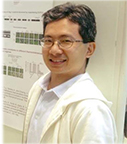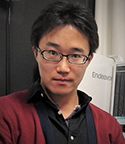Recognizing featured Plant Cell first authors, December 2016
Recently, we’ve been profiling first authors of Plant Cell papers that are selected for In Brief summaries. Here are the first-author profiles from the December issue of The Plant Cell.
Yao-Pin Lin, featured author of Identification of Chlorophyll Dephytylase Involved in Chlorophyll Turnover in Arabidopsis
 Current Position: Postdoctoral fellow in Agricultural Biotechnology Research Center, Academia Sinica, Taiwan.
Current Position: Postdoctoral fellow in Agricultural Biotechnology Research Center, Academia Sinica, Taiwan.
Education: PhD: TIGP-MBAS, Graduate Institute of Biotechnology, National Chung Hsing University (NCHU), Taiwan.
Non-scientific Interests: Hiking and watching movies.
After obtaining a B.S. degree in Botany at NCHU, I started my journey in plant research by joining Dr. Bor-yaw Lin’s lab as an M.S. student at the Institute of Molecular Biology of the same school. In his lab, I learned cytogenetics by working on the propagation of maize multiple-mutants, observation of B chromosomes, and molecular biological assays. After graduation, I spent a couple of years serving as a teaching assistant in a Genetics class at the same institute and helped to handle administrative affairs. To continue to pursue my interest in plant research, I joined the Ph.D. program in Molecular and Biological Agricultural Sciences (Taiwan International Graduate Program) co-operated by Academia Sinica and NCHU. The major focus of my mentor’s lab is to understand how plants protect themselves against different heat stress conditions. I was given a project characterizing Arabidopsis mutants with defects in plant thermotolerance and cloning of the responsible genes. Fortunately, it became clear that my previous training in maize genetics made my life easier in mapping and cloning of the CLD1 gene, which, we later showed, encodes a long-sought enzyme that removes the phytol chain from chlorophyll during its turnover. I am very happy that the paper will be published in the same month of my wedding.
Takashi Akagi, featured author of Epigenetic Regulation of the Sex Determination Gene MeGI in Polyploid Persimmon

Current Position: Assistant Professor, Laboratory of Pomology, Graduate School of Agriculture, Kyoto University, Japan.
Education: PhD (2011), Graduate School of Agriculture, Kyoto University, Japan.
Non-scientific Interests: Orchestra performance (clarinet), piano, composition, fishing.
I have been associated with the field of Pomology, which is nested in Horticulture and studies on tree crops, since the beginning of my research life. In my Ph.D. studies, I investigated the astringency trait in persimmon fruit, mainly from the viewpoints of phytochemistry and molecular biology. After finishing my doctorate studies at Kyoto University, I was interested in learning new technologies, particularly bioinformatics. At just the right time, I fortunately had the opportunity to study as a visiting scientist with Drs. Luca Comai and Isabelle M. Henry at the Genome Center, University of California Davis. Using diploid Caucasian persimmon as the study material, we launched an investigation to identify dioecious sex determinant genes, which had not been isolated in any plant species. Our assembly of bioinformatics and evolutionary analyses rapidly enabled us to identify a Y-chromosome-encoded sex determinant, named OGI, and its counterpart gene, named MeGI. Continuing this excellent collaboration, we then tried to elucidate the variations in sexuality in various persimmons (Diospyros spp.), including the flexible sexuality in hexaploid Oriental persimmon (D. kaki), in the current study.




Leave a Reply
Want to join the discussion?Feel free to contribute!